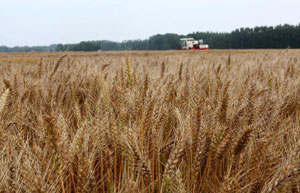More sustained efforts necessary to maintain growth in domestic production of staples
China should consider flexible grain imports from international markets and take steps to ensure sustained growth in domestic output of staple grains, for long-term food security, government officials and foreign exporters said on Thursday.
The first policy document of 2014 or the "No 1 Central Document" issued by the central government for the 11th consecutive year focusing on rural issues and agricultural development has identified food security as its top priority. It stressed that adequate grain imports would help ensure grain security.
Cheng Guoqiang, secretary general of the academic committee at the Development and Research Center of the State Council, said grain imports should be based on factors like quantity, the diverse nature of foreign grains and also on flexible import strategies.
"The biggest change in China's new strategy to ensure grain security is that of adequate imports. It is an important measure that ensures sufficient grain supplies from the world market," Cheng said at an industry forum on Thursday.
Indeed, proficiently using both foreign and domestic market resources, adequately increasing grain import quotas when prices fall in international markets and encouraging capable companies to develop agricultural business in foreign countries have all been adopted by the central government to ensure grain security this year.
Fang Yan, deputy director-general of the department of rural economy at the National Development and Reform Commission, said the fundamental guidelines for achieving food security in China have been clearly outlined so as to stabilize and increase domestic grain production, while making full use of international resources.
China's average meat consumption per capita has increased steadily over the past nine years. Meat consumption will keep growing with China's ongoing urbanization process boosted by people's rising incomes.
To gain enough grain and farm products from the overseas markets, soybean and corn trade between the China and the US has expanded substantially in recent years, and played a critical role in meeting domestic consumption needs and in promoting industrial development.
"With more scaled and standardized production, growth in population and per capita income, and improving diet, we see great potential for continued expansion of grains and oilseeds trade and further cooperation between China and the US," said Scott Sindelar, minister-counselor of agricultural affairs at the US embassy in Beijing.
Bryan Lohmar, China country director of the US Grain Council, suggested that the Chinese government should accelerate the pace of approvals for agricultural bio-technologies and also allow imports of genetically modified grains. Each country has a different approval procedure for bio-technologies, while import of GM grains is yet to be approved in China, whereas it has got the green light in several other nations.
Since China is one of the biggest soybean buyers globally, Lohmar said many farmers from the US, Brazil and Canada are planning to use new soybean seeds after the technology gets approved in China.
 |
 |
| Wheatharvestseason in China | China to continue grain imports |
